January 8, 2024
6 Online Community Platforms in 2024

Carly
If you’re looking to bring people together, an online community platform is the way to go.
Online community platforms provide a space for like-minded people to connect, collaborate and learn. They offer a range of tools that make sharing information easy and accessible. Best of all, everything is housed in one place. From discussions to courses to events and everything in between.
By building an online community, you can offer users access to valuable resources and insights. Online community platforms are all about providing an immersive experience that keeps people coming back for more. So, let’s get into six online community platforms you should check out.
Circle.so
Circle.so is a bit of a newcomer in the online community platform scene, designed specifically for course creators. While it may not be as established as some other platforms, it does offer some great features.
What sets Circle.so apart is its focus on serving course creators. With a native online course builder, educators can easily create and deliver educational content to their audience. The platform offers flexible Spaces, allowing for organized discussions and content categorization.
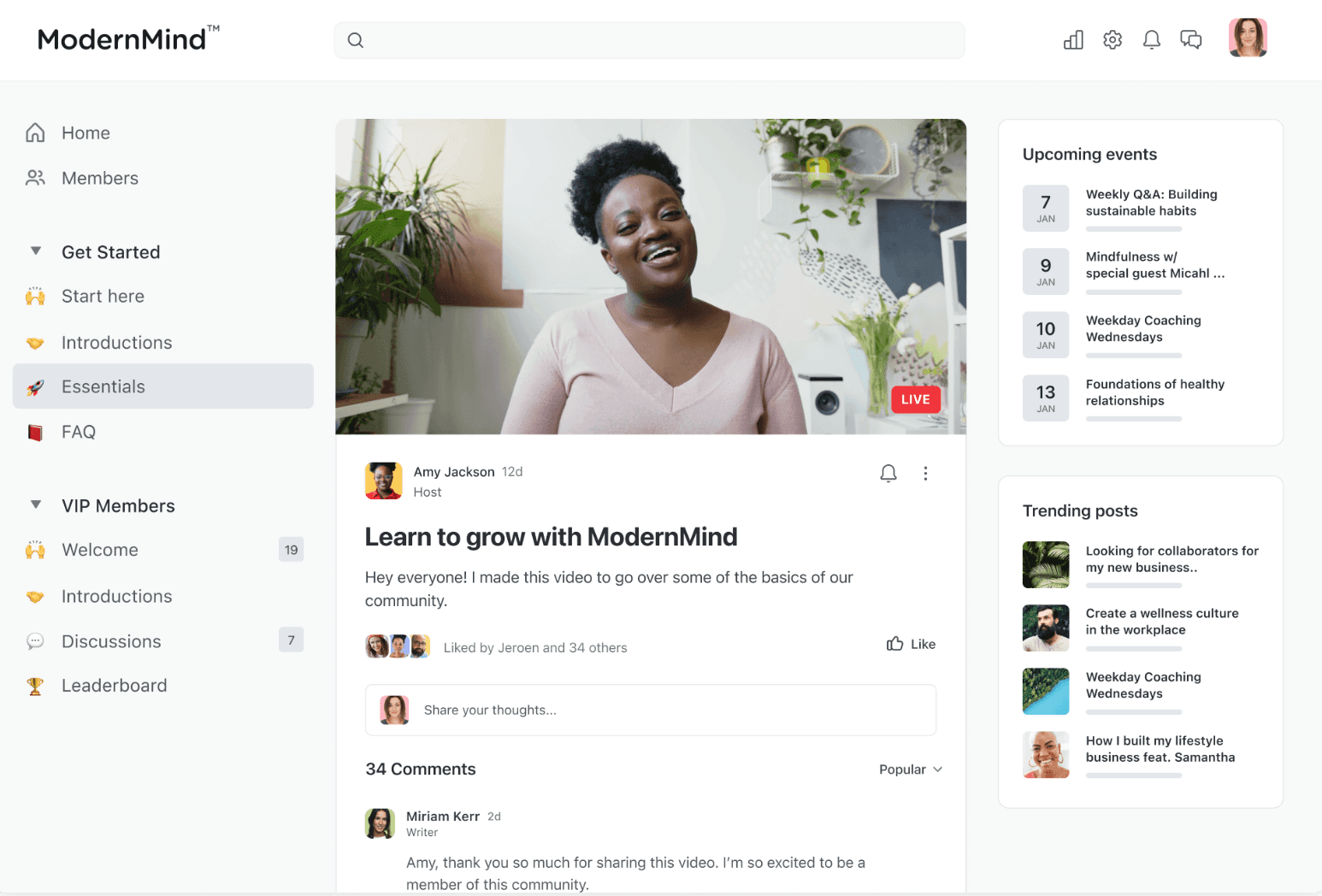
One aspect to consider is the customization options. While you can customize the logo, colors, and sections to align with your branding, the platform falls short when it comes to restructuring the layout. So, if you're looking for extensive personalization, you might want to explore other alternatives.
On the bright side, Circle.so boasts an intuitive user interface, making it easy for both administrators and members to navigate and engage with the community.
When it comes to analytics integrations, Circle.so has some limitations. The range of analytics tools it supports might be more limited compared to other platforms. If in-depth analytics and data insights are crucial for your community, it's worth considering this aspect.
In all, Circle.so is a solid option for course creators. While it may not offer extensive customization possibilities and has some limitations in terms of analytics integrations, its intuitive interface and focuses on course creation make it a platform worth exploring.
Circle.so product demo
Pricing
Circle.so offers a range of pricing plans to suit different needs and growth stages.
Basic Plan: $49/month
Essential features for launching a basic community.
Pro Plan: $99/month
Key features for building and growing a community.
Business Plan: $219/month
Scaling capabilities with advanced workflows and customization.
Enterprise Plan: $399/month
Full feature access, dedicated services, and priority support.
Custom Pricing
Get your own branded community app up and running in less than six weeks.
All plans come with a 14-day free trial, no credit card required, and the freedom to cancel anytime.
Kajabi
Kajabi.com is an all-in-one platform that offers a range of built-in marketing tools, making it a convenient choice for entrepreneurs and content creators. You can easily promote your online courses and membership programs without the need for third-party integrations.
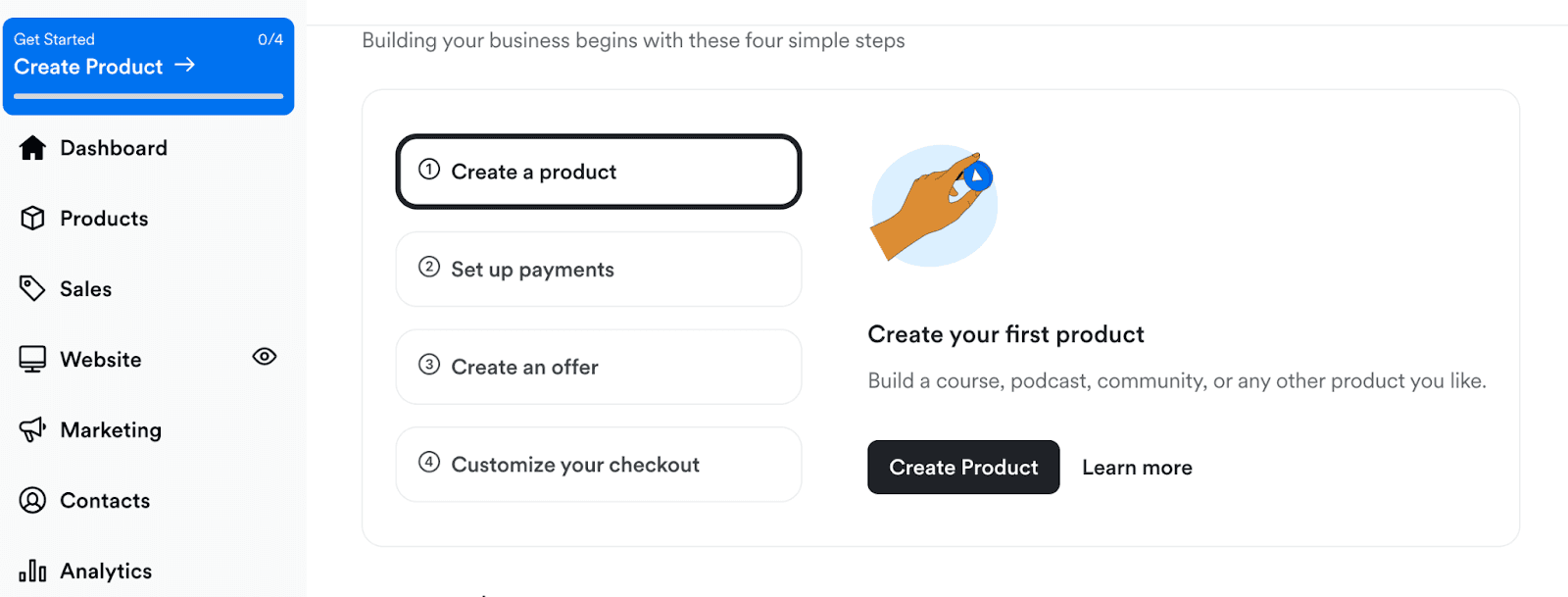
One of the standout features of Kajabi is its ability to host online courses. It provides a simple page-building mechanism, making it easy to create engaging and interactive course content. Its email marketing system also allows for smooth communication with your audience.
However, the page builder in Kajabi may not be as intuitive as some of its competitors. Navigating through different elements and settings can require more clicks than desired. On top of that, the onboarding process and explanation of where everything is located could be improved for a smoother user experience.
On a positive note, Kajabi allows you to house multiple programs and content with different access levels, providing flexibility for your membership offerings. It also offers tools to assess the individual participation level of participants, helping you tailor your interactions and support accordingly.
When it comes to developing sales pages for product launches, Kajabi makes it easy. However, some users may find the customization options somewhat limited, as the available templates may not fully meet their specific needs.
To sum it up, Kajabi offers an all-in-one platform with intuitive marketing tools and the ability to host online courses. While the page builder and onboarding mechanism could be improved, it does well in providing an all-in-one solution.
Kajabi product demo
How much does it cost?
Kajabi offers three pricing plans, each tailored to suit different needs.
Basic: $149/month
Core features for starting a community
Growth: $199/month,
The most popular choice.
Expand your offerings, reach a wider audience, and drive business growth.
Pro: $399/ month
Ideal for growing businesses, offering advanced features and scalability.
Thinkific
Thinkific is a course platform that stands out for its unique features and user-friendly experience. One of its major highlights is access to a free option with no transaction fees, making it a great choice for those starting out.
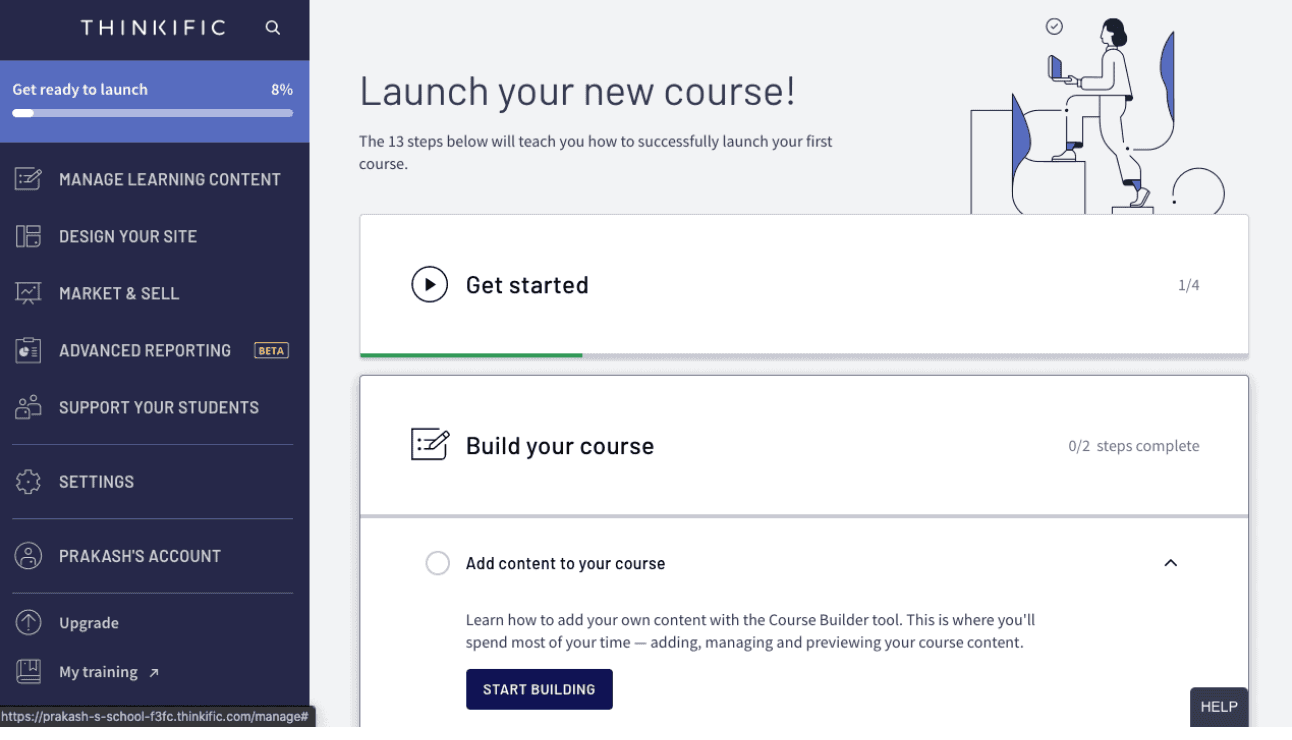
Customization is another strong suit of Thinkific. You have the freedom to customize the look and feel of your course to match your business or website, enhancing the branding and user experience. Thinkific also allows you to set up a custom domain, making your course appear seamlessly integrated with your website.
When it comes to payment options, Thinkific offers flexibility. You can provide students with payment options like monthly payment plans, particularly useful for more expensive courses. You can also implement a monthly recurring subscription model, allowing ongoing access to courses through a membership structure.
While Thinkific has a number of strengths, there are a few cons to consider. To start, there’s no course marketplace integrated within the platform, limiting your ability to market your course directly. However, it can easily integrate with popular third-party tools like MailChimp, Aweber, ClickFunnels, and LeadPages to meet those needs.
Another minor drawback is the lack of chat support; however, Thinkific makes up for this by being one of the only platforms to offer phone support.
Thinkific is a solid and user-friendly platform for course creators. It offers a free option, customizable features, and phone support. You can provide various payment options to your students. While it lacks some built-in features, Thinkific seamlessly integrates with popular third-party tools, allowing you to customize your experience to meet your specific needs.
Thinkific product demo
How much does it cost?
Thinkific keeps things simple with just two plans, which both offer a 30-day free trial.
Start: $74/month
Basic features and tools to launch your first course.
Grow: $149/month
Complete suite of tools to build a successful business and sell more.
Skool
Skool.com has evolved over the years, offering a solid set of features that enhance community creation. It allows users to create content, build their members' profiles, engage through direct messaging and more.
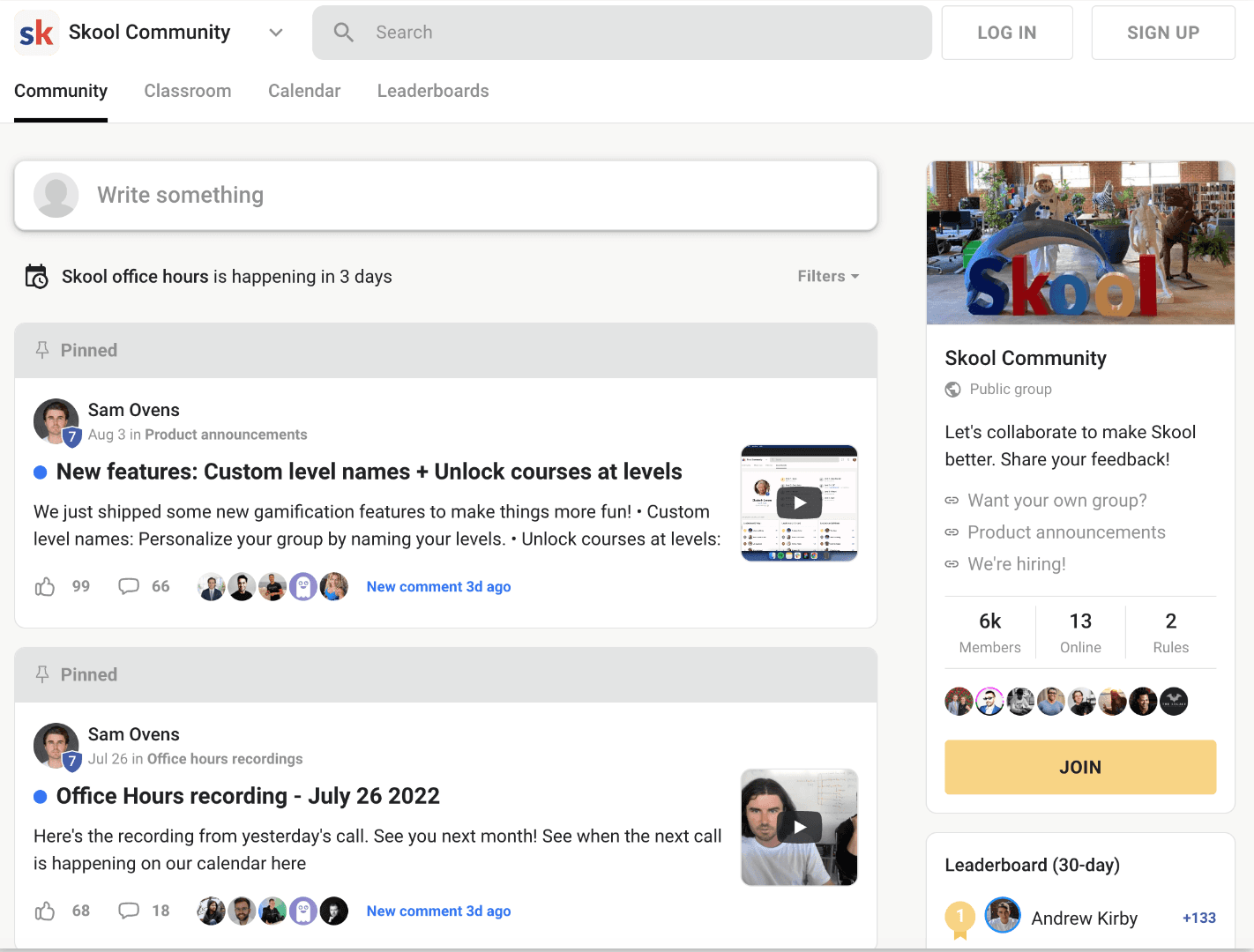
Skool simplifies community management for course creators. Its visual calendar and mobile app make event organization a breeze, eliminating the need for multiple tools like Facebook groups.
Using Skool's simple back-end menu, you can easily add content and categorize your course into different modules. However, it's important to note that Skool currently doesn’t support video hosting, so you'll need to use external solutions like YouTube, Vimeo, or Wistia. When it comes to the course layout and design, customization options are limited, but the default build is sleek and user-friendly.
While Skool offers a range of features, it currently lacks certain learning tools found in other platforms, such as quizzes, assessments, and PDF embed capabilities.
One intriguing aspect of Skool is its gamification feature, which adds an element of fun for community members. Overall, Skool provides a comprehensive solution for course creators, although some improvements in video hosting, layout customization, and learning tools could enhance the platform's capabilities further.
Skool product demo
How much does it cost?
For $99/month, you get access to all of Skool’s features, unlimited courses, unlimited members, and the ability to create one group. Plus, you get everything included, with no hidden fees.
Facebook Groups
Facebook Groups is a powerful tool for creating a community. Many customers are already familiar with it, making it easy to engage with them. With Facebook Groups, you can easily tap into your community, gathering ideas and feedback firsthand. Plus, the active engagement within your group serves as social proof, enticing others to join the conversation.
Another advantage is that it makes you more accessible to your customers. They can easily connect with you and other members, creating a sense of belonging. Not to mention, it's a budget-friendly option for building communities compared to other platforms.
Facebook Groups are also great for customer retention. By creating a space where your customers can interact with each other and with you, it strengthens their connection to your brand. The easy-to-use tools offered by Facebook make managing the group a breeze.
However, there are some cons to consider. One major drawback is that you don't own the platform. This means you're subject to any changes Facebook might impose. Organizing content within Facebook Groups can also be a headache, especially as your group grows.
Managing closed groups can become overwhelming, especially when it comes to member requests and moderation. It requires effort to build and maintain an active community, and there's always a risk of your content getting buried among other posts in the Facebook feed.
Despite a few challenges, Facebook Groups is still a go-to option for building communities. It's widely used and easy to access, making it a valuable platform for engaging with your audience, generating ideas, and keeping customers coming back for more.
How much does it cost?
Facebook Groups is completely free to use. You can create and manage your group without incurring any charges or fees.
Slack
Slack may not be the typical community platform, but it can still work well as a community tool. You can create dedicated channels for different interest groups, keeping discussions organized and engaging. Whether it's public channels for open conversations or private channels for sensitive topics, Slack gives you the flexibility to customize your space.
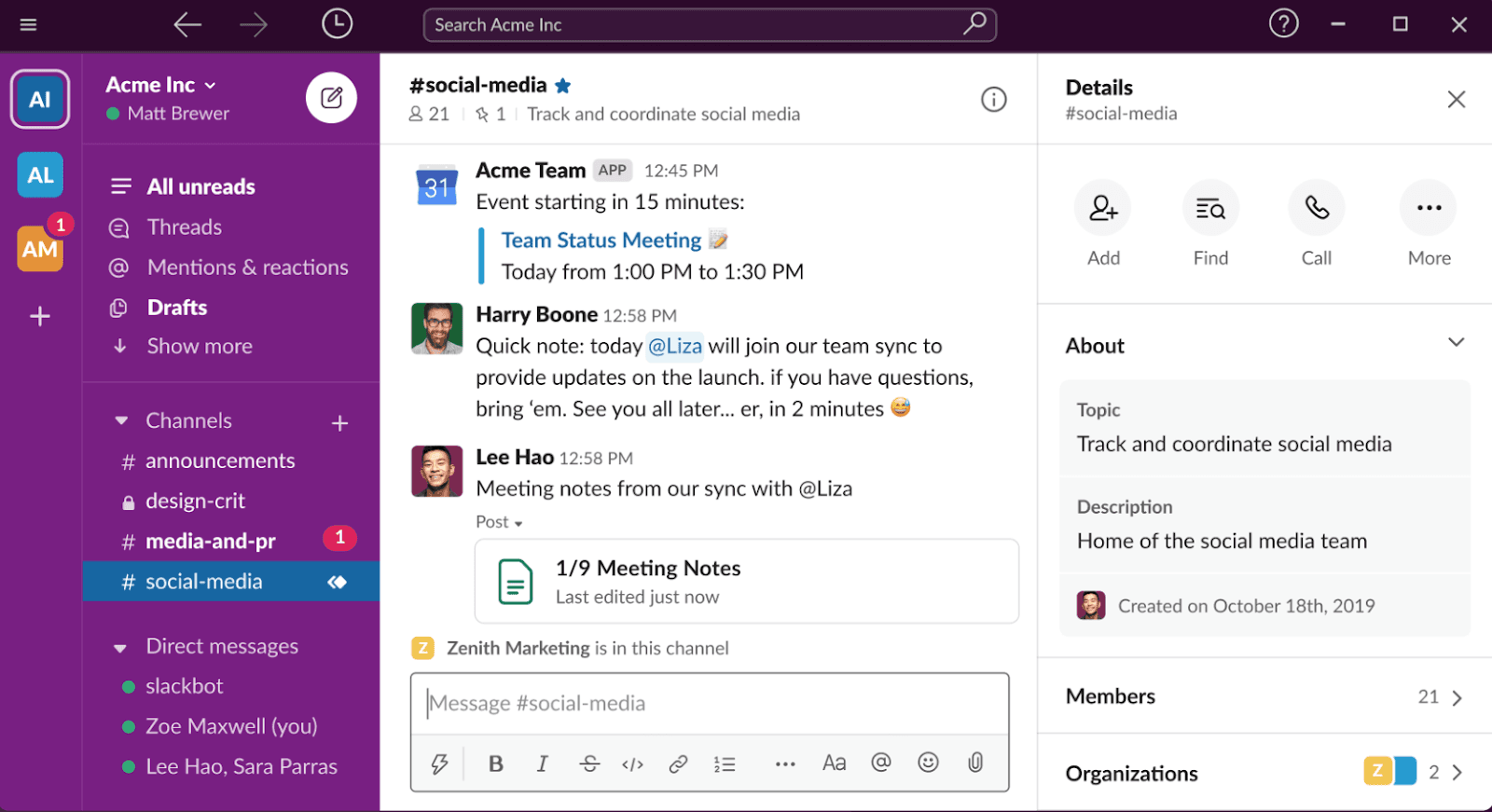
Collaboration in Slack is a cinch. You can share ideas, documents, and media in real-time, making it easy for community members to work together and stay on the same page. Plus, Slack integrates with other apps and services, allowing you to bring in tools and resources to enhance the community experience.
Security is a priority for Slack. Your community data is protected through encryption, ensuring that your discussions and files are kept safe. With enterprise-level security controls and compliance certifications, such as GDPR checklists and SOC 2 reports, you can trust that your community is in good hands.
While Slack may not have all the fancy community features you'll find in dedicated platforms, it still provides a solid foundation for community interactions. Just keep in mind that advanced functionalities like member directories or detailed analytics can be limited.
All in all, Slack offers a versatile platform for community building. Although it’s not specifically designed for communities, it can still be a valuable tool thanks to its communication tools, customizable channels, and collaboration features.
Slack product demo
How much does it cost?
Along with a free version, Slack also offers a few other options.
Pro
7.25/month
Unlimited message history, apps/integrations, voice huddles, and secure collaboration with other companies through Slack Connect.
Business+
12.50/month
99.99% uptime, user provisioning/de-provisioning, SAML-based single sign-on, and data exports for all messages.
Enterprise Grid
Custom pricing for enterprise-level businesses
Find the right community platform for you
When it comes to creating and growing an online community, the right platform can make all the difference. Whether you opt for Circle, Kajabi, Thinkific, Skool, Facebook Groups or Slack, each platform brings its own strengths to the table.

Tella — the screen recorder that edits videos for you.


